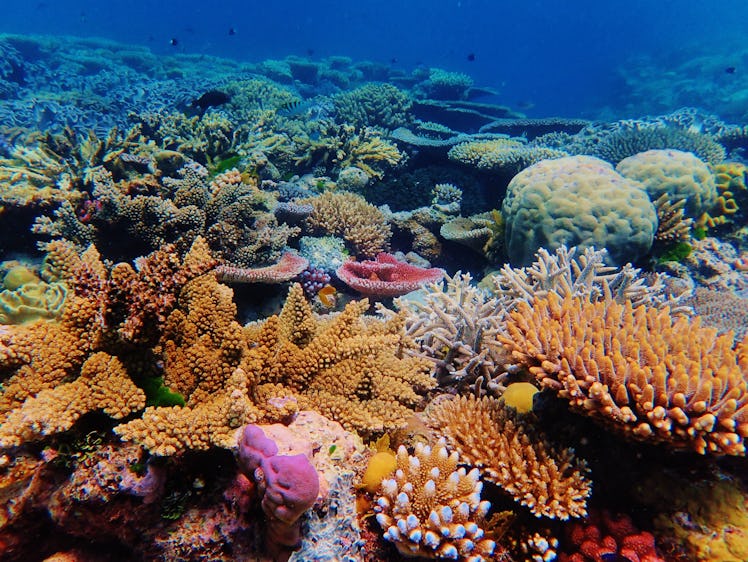The Great Barrier Reef Recorded Highest Coral Levels In 36 Years — But There's A Catch
Some positive news from the world’s largest coral reef system.

A newly released report brings some good news about the health of the Great Barrier Reef. The world's most extensive coral reef system has been closely monitored for decades; and for the first time in 36 years, researchers recorded the highest amount of coral cover in the area. Here's what that means, and why it's still essential we be mindful of sea changes that harm the important ecological system.
The new Australian Institute of Marine Science report highlights some positive news. The organization, which has been monitoring the world's largest coral reef system that covers approximately 109,800 sq mi off the coast of Australia, has recorded the highest amount of coral coverage in 36 years, a sign of a healthy (or healthier) reef.
The survey of 87 reefs found that from August 2021 to May 2022, the northern and central regions of the Great Barrier Reef had hard coral cover levels of 35% and 33%, respectively. In the southern region, the coral cover decreased by 4%, which researchers say is "due to an outbreak of crown-of-thorns starfish," per CNN.
"It's a rare piece of good news for the world-famous reef," CNN notes. Dr. Mike Emslie, team leader of the Australian Institute of Marine Science monitoring program, said the increase in coral was largely driven by Acropora corals which are "particularly vulnerable" to wave damage caused by tropical cyclones, coral bleaching, and as prey for the starfish.
Australian Institute of Marine Science CEO Dr. Paul Hardisty agrees that the increase in coral is a positive sign for the Great Barrier Reef. He noted that the results show there is still the possibility of the reef recovering from mass bleaching. Coral bleaching "is a result of warmer than normal water temperatures which triggers a stress reaction from the corals," according to CNN. When coral reefs bleach, and die, entire ecosystems of fish that rely on these beautiful environments can die, too — leading to a collapse in an important underwater ecosystem. The way to save the barrier reef is, ultimately, to fight climate change.
Dr. Hardisty and other scientists caution that although this is fantastic news, the reef is still very susceptible to harmful climate change from which the reef may never recover. Dr. Hardisty emphasized that the loss of coral elsewhere along the reef suggests marine heatwaves and other threats are still putting the whole reef at risk.